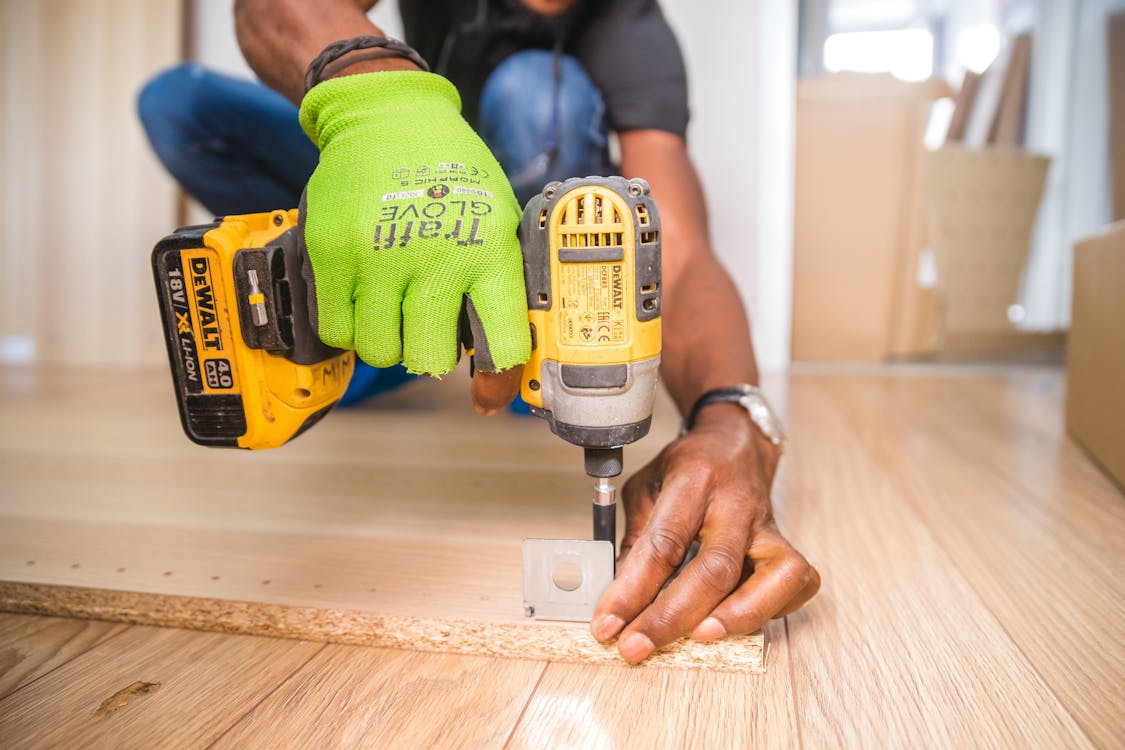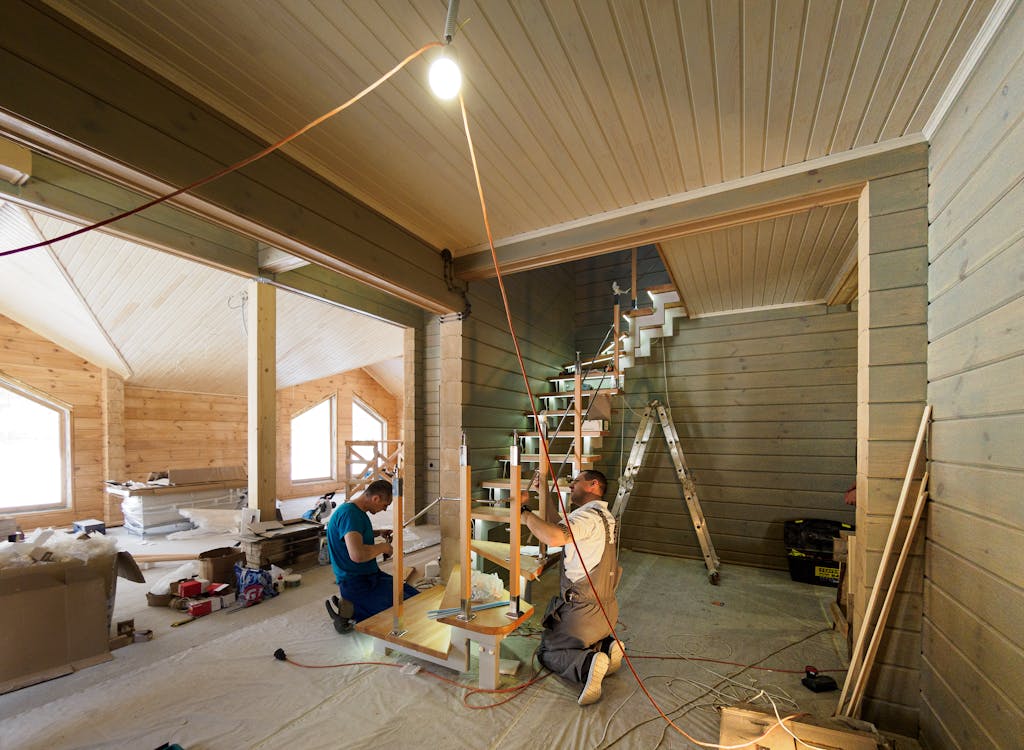This post may contain affiliate links. Please read my disclosure for more information.
Big home improvement projects can be intimidating to start if you’ve never tackled one before. No worries though, this article will guide you through 5 things to consider before starting a big home improvement project to help make yours as smooth as possible.
5 Things to Know Before Starting a Big Home Improvement Project
A home renovation is one of the most rewarding projects to take on as a homeowner, but it’s also one of the most difficult. Big home projects come with many hurdles to overcome; whether it be price, planning, or execution, it’s a daunting task.
Even if it seems like an impossibly difficult challenge, it’s completely doable if done correctly. If you’re properly prepared, a home renovation can reward you with increased home value as well as personal satisfaction.
To make sure you get started in the right place, check out our list of the top things to know before starting your home improvement project.
1. How Will You Pay For It?
This may be the most important step since you can’t start your project until you have the funds for it. There are a multitude of options for how you can fund a renovation depending on your financial situation and the size of the project you’re working on.
How much will the home improvement project cost?
You must get a written estimate of the cost so you can mentally prepare for the overall budget of your project. Once you have your estimate, it’s time to figure out how you’re paying for your project.
How will you pay for the improvements?
Fortunately, there are different options to get ahold of the money you need to improve your home. The most obvious way to finance a project would be to pay for it yourself out-of-pocket.
This can be a great option for those who can save up to the needed amount. Luckily there are many ways to save money on a budget.
Unfortunately, home improvements can get costly quickly. For example, the average kitchen renovation cost ranges from $5,000 to $50,000 depending on the size and scope of your remodel. It can be very difficult to save that much money.
Financing a big home improvement project
If you’re not able to save that kind of money, or if you need your project done quickly, you should look into loan options to pay for your home improvements. For many, a home equity line of credit or HELOC is a great option.
With a HELOC you can borrow money as needed based on the equity of your home. This is a great option since you can borrow as much as you need and then after the work is done, you can start paying back from there.
Since there are often unexpected costs involved in home improvements, having the choice to take what you need before you start repaying is a great option. Another huge benefit is that, if used for home improvements, a HELOC is tax deductible.
2. Should You DIY It?
Once you have your budget in place, you’re ready for the next step of the home improvement process. The next important thing to consider is if you are going to attempt your project on your own or if you’ll hire the project out.
Of course, the biggest difference between the two is the cost of professionals vs. DIY. There are pros and cons to both options that should be considered before making a decision.
Pros of a DIY Home Improvement Project
The biggest pro of a DIY project is that you’ll be saving money in theory. There is not a set rate on what a contractor will charge as this will vary by your state or even the city you live in. On average you can expect to spend around $25 to $85 per hour.
By choosing DIY you can help lessen the out-of-pocket cost of home improvement. You can also work at your own pace depending on the nature of your project.
If the project is not an immediate need then it could be helpful to take your time to complete the work. You can also use the project as an opportunity to learn a new skill or two.
Cons of a DIY Home Improvement Project
The cons of DIY home improvement can be quite extreme. It is true you can save a lot of money by DIYing, but if you lack the necessary knowledge and skills it will end up costing you in the long run.
One example would be if you start a renovation in your home and find asbestos, which would need to be removed by a professional. Another example of needing knowledge would be knowing what permits and codes you need to follow when doing a large-scale project.
There is also the fact that large-scale projects can be physically dangerous. Professionals are trained to be around dangerous equipment and materials and are less likely to get hurt while doing their jobs than someone without experience.
3. Should You Hire a Professional?
Pros of hiring a professional
The biggest pro of hiring a professional is that you’re secure in the knowledge that the work being done is done correctly. The years of learning and experience they bring to the table means you can be secure in the knowledge the work will be done correctly.
Professionals also can get deals with distributors like Home Depot offering special services and savings for professional and contractor services, allowing them to get their hands on materials at a discounted rate. This means that they can potentially save you money on the overall cost of your project.
A professional will also know exactly what permits will be needed to complete the job correctly and often can help expedite the approval process.
Cons of hiring a professional
The cons of using professionals come in the form of cost and time. The skills and knowledge they have will not come cheaply. As stated above, the average cost can be between $25 to $85 per hour.
This can add up quickly depending on the size and length of the job. When you hire someone to do the work you may also have to tackle the issue of scheduling.
You most likely won’t be the only person who has hired your worker, and your desired contractor may be busy at the time you want the work done so you’ll have to work around their schedule.
4. What Will Life Be Like During The Project?
Home improvement projects can take many different shapes and sizes. Some are as simple as a few new appliances or new carpeting in your home.
Others change the very layout of your home and require a great deal of thought and planning. The longer a project goes on, the larger the impact will be on your day-to-day life.
A large home improvement project could make living in your home during construction a hassle. It’s important to consider if you’ll be able to remain in your home while the project is going on.
Will you need temporary housing?
A large-scale project could mean temporary housing may be needed. With temporary housing comes another large expense with renting a short-term residence.
The other option is to live in your home while your project is ongoing. There are tons of tips you can learn to make the process easier.
Living in your home through a big home improvement project
If you’re working in your kitchen you’ll need to find ways to store your food and cooking supplies. In the event your kitchen is unusable, you’ll need to factor in the cost of buying food more than normal.
If it’s your living room that’s not usable you should try to create a different space in your home where your family can congregate to spend time together.
If you have a bathroom being remodeled then it would be smart to set up a schedule for when everyone can use an available bathroom to keep arguments from happening.
Taking the time to plan life around your project will help ease tension in your home while it is going on.
5. What Time of Year Should You Do Your Home Improvement?
The last big question you should ask yourself is “what time of year should I do this project?” Most people would want to start a big project in either the spring or maybe during the summer when it’s easy to spend time out of the house while work is being done.
What’s the best time to schedule a home improvement project?
Though it’s certainly more convenient to schedule big projects for the warmer months, it turns out that the best time for contractors is the winter. This is because many people don’t want their homes ripped up over the holidays.
While this may disrupt your holiday plans, there are some wonderful benefits to planning your project for the winter months. Since this time of year is slower for contractors it’s likely that you’ll get extra time and care focused on your project.
It’s also possible that you’ll be given a deal on the work since contractors don’t have as many jobs and want to keep their crews busy.
The spring is also a great option if you’re considering an outdoor project. Things like decks and patios require digging by hand and oftentimes the ground is much softer in the spring than at other times of the year.
You will also have the benefit of enjoying your new outdoor space throughout the summer and fall. The downside to planning for this time of year is that it’s a busy time for contractors. So you’ll have to work around their schedule as well as pay a premium price for their services.
Big Home Improvement Project Conclusion
Starting a big home project can be a very stressful time with all the decisions that need to be made beforehand.
By taking the time to carefully plan before you start you can help ensure that the home improvement process goes as smoothly as possible.
After going over the five things in this list, you’ll be able to make an informed decision on what’s best for you and what’s best for your home.














Leave A Comment